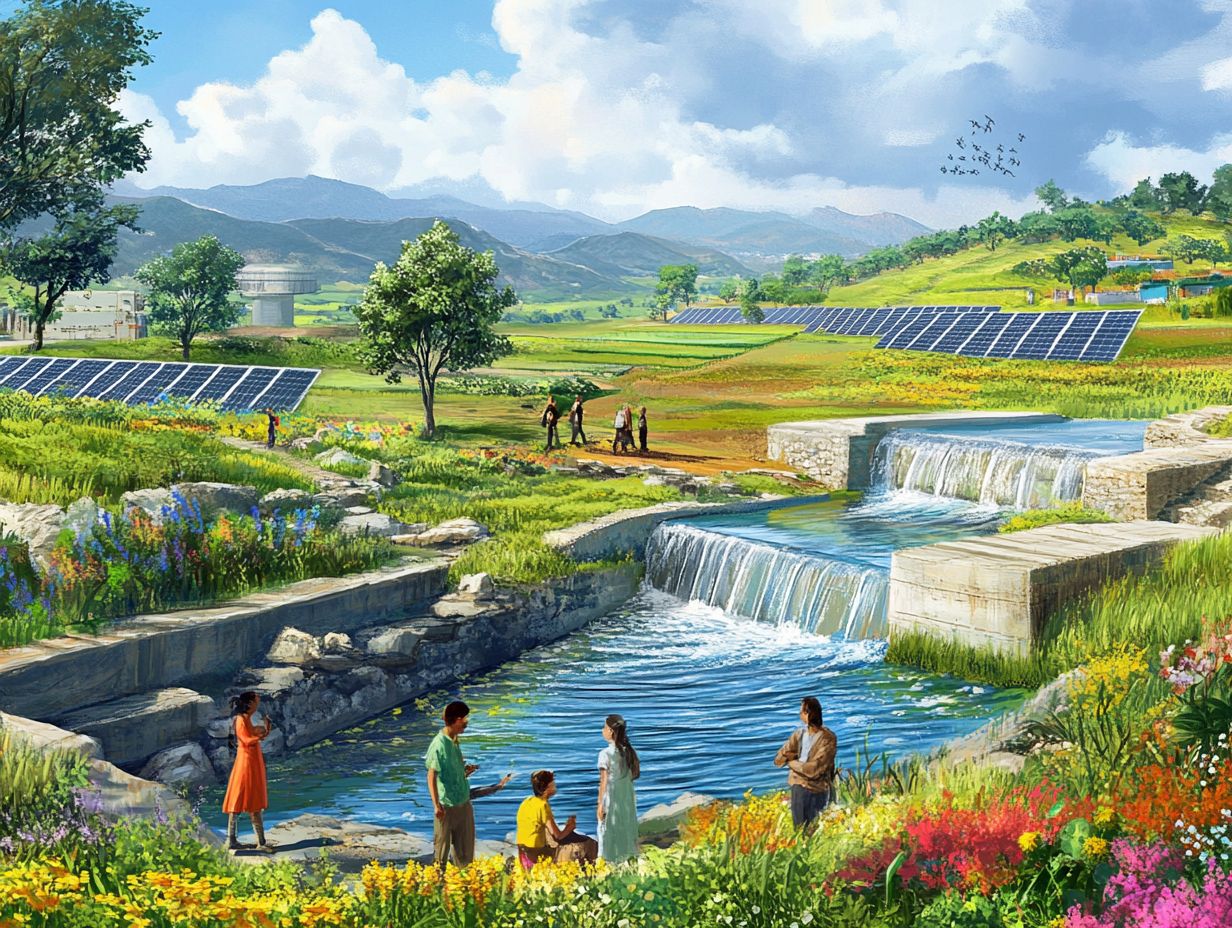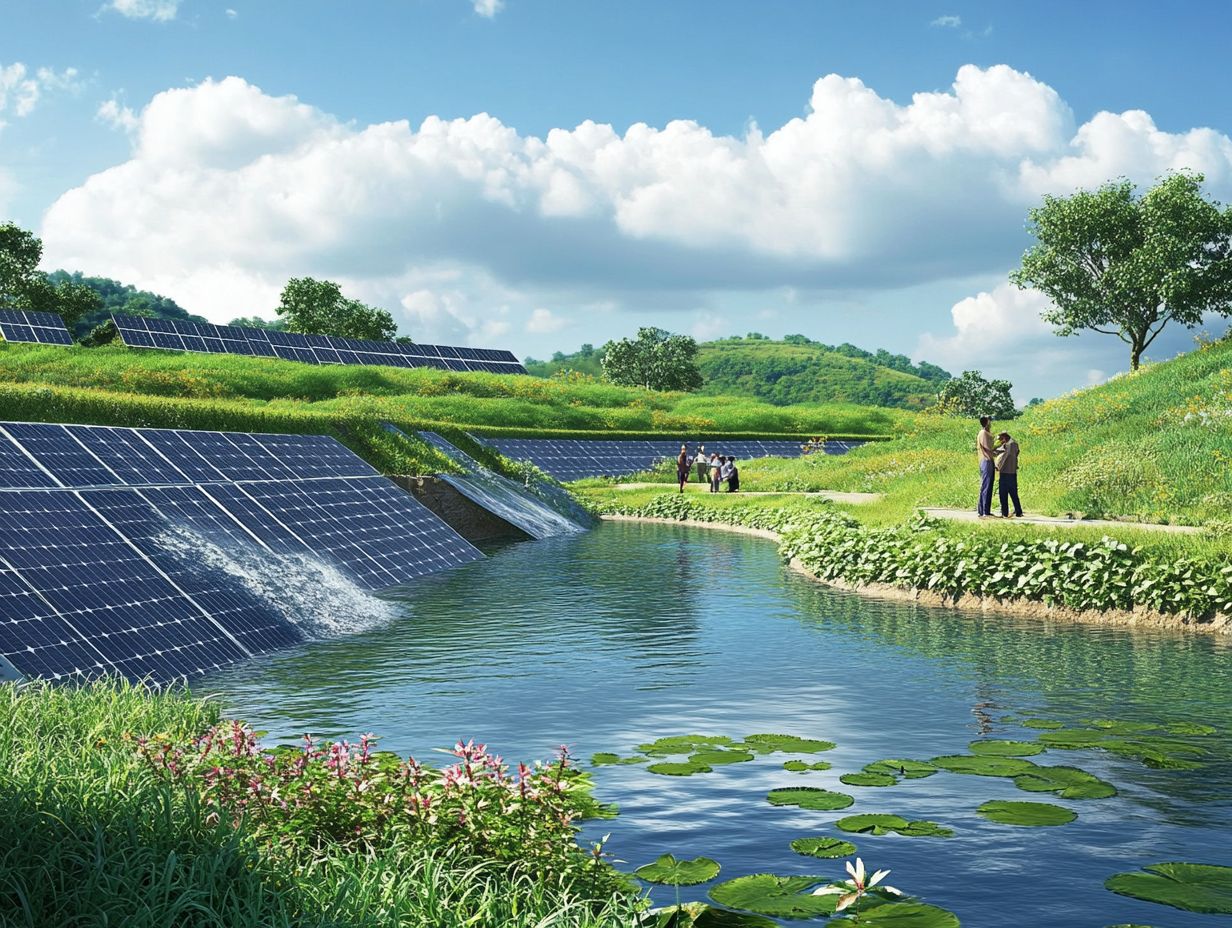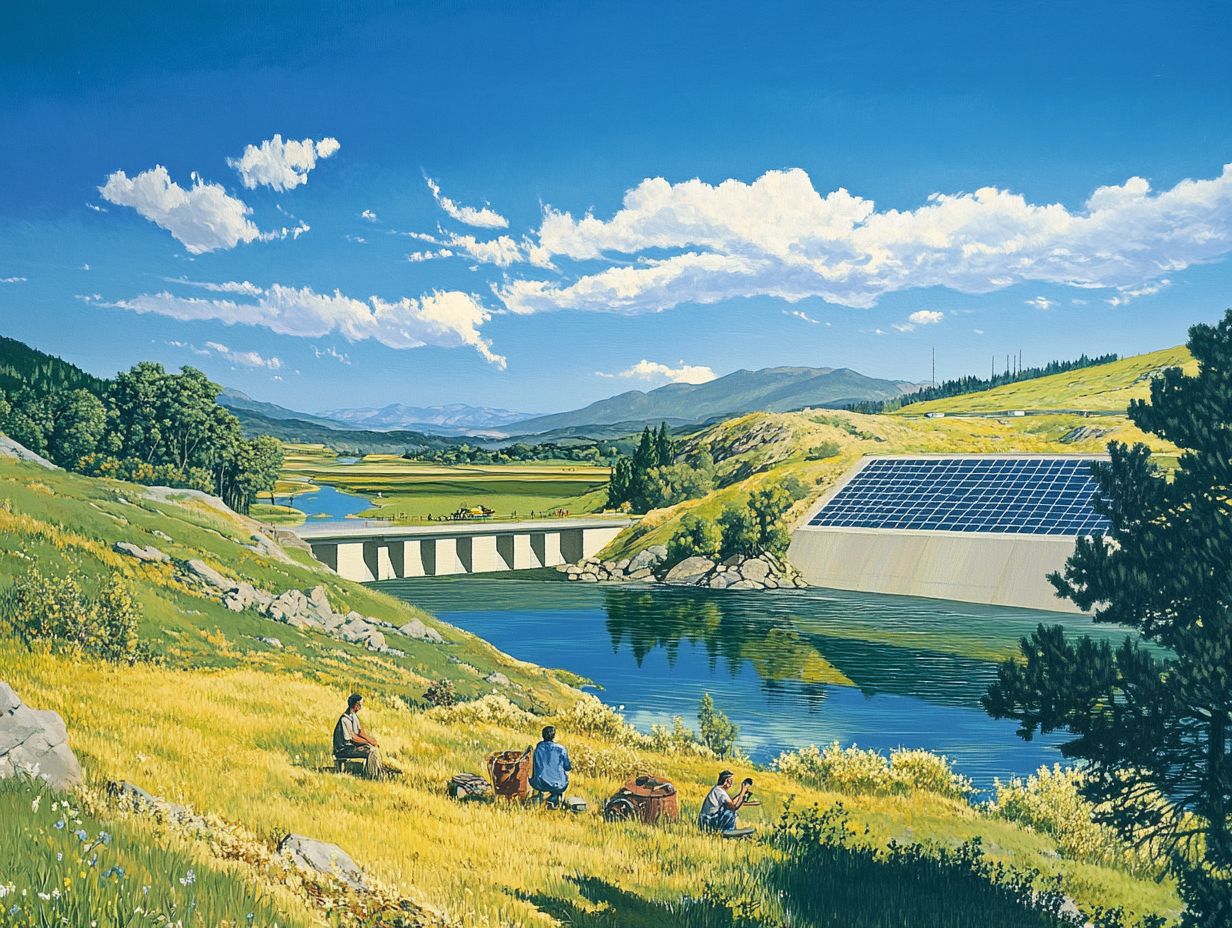5 Examples of Successful Water Management
Water scarcity stands as a pressing global challenge, yet innovative solutions are emerging from various corners of the world. This article delves into five exemplary water management programs: Singapore’s NEWater initiative, Israel’s conservation efforts, Australia’s water trading system, India’s community-led management, and the United States’ recycling programs.
By spotlighting these successful strategies, you ll uncover critical factors for effective water management, confront implementation challenges, and weigh potential benefits alongside risks. Explore how these initiatives can inspire meaningful change and discover what you can do to contribute to sustainable water practices.
Contents
- Key Takeaways:
- 1. Singapore’s NEWater Program
- 2. Israel’s Water Conservation Efforts
- 3. Australia’s Water Trading System
- 4. India’s Community-Led Water Management
- 5. United States’ Water Reuse and Recycling Programs
- How Can These Examples Be Replicated in Other Countries?
- What Are the Key Factors for Successful Water Management?
- What Are the Challenges Faced in Implementing These Programs?
- How Do These Programs Benefit the Environment and Society?
- What Are the Potential Risks and Limitations of These Programs?
- What Can Individuals Do to Contribute to Better Water Management?
- Frequently Asked Questions
- What are some examples of successful water management?
- How does responsible water management benefit the environment?
- How can communities implement successful water management practices?
- How do successful water management practices benefit communities?
- How can individuals contribute to successful water management?
- What challenges do communities face in implementing successful water management?
Key Takeaways:
- Singapore’s NEWater program has successfully reduced the country’s reliance on imported water through innovative technology and efficient management, serving as a model for other countries.
- Israel’s water conservation efforts, such as using advanced irrigation systems and reusing water from sinks and showers, allow the country to thrive in a water-scarce region, showcasing the importance of proactive measures.
- Australia’s water trading system effectively manages water resources by allowing farmers to buy and sell water allocations, promoting efficiency and sustainability.
1. Singapore’s NEWater Program
Singapore’s NEWater Program is a remarkable initiative in effective water management. It tackles water scarcity through innovative practices and advanced treatment technologies. By prioritizing sustainable water use and conservation efforts, it significantly enhances the quality of water available to its citizens.
This program employs state-of-the-art filtration and purification methods, including microfiltration and reverse osmosis, to convert wastewater into high-quality reclaimed water. This approach not only conserves invaluable resources but also helps combat problems like areas that become hotter than their rural surroundings by fostering sustainable practices in water recycling.
The program also plays a crucial role in engaging the public and educating communities about water conservation. It promotes responsible consumption, setting a global standard for other cities facing similar challenges. This illustrates that integrated water management can cultivate resilient urban environments and raise awareness of sustainability.
2. Israel’s Water Conservation Efforts
Israel s water conservation efforts are a global beacon of innovative strategies. By employing efficient technologies that significantly reduce waste, the country has turned challenges into remarkable opportunities for sustainability.
Community involvement is critical, as residents are educated on the importance of water conservation and encouraged to adopt environmentally friendly practices. Schools nurture a culture of responsibility and awareness among future generations.
Despite these achievements, Israel faces ongoing challenges to water security, including shifting climate conditions and rising demand. The collaborative efforts between governmental agencies and local communities underscore the necessity of continual innovation and adaptive management in preserving these essential resources.
3. Australia’s Water Trading System
Australia s water trading system stands as a remarkable example of resource management, showcasing how efficient allocation and utilization of water resources can lead to significant economic savings and enhanced water efficiency.
This innovative framework allows you to buy and sell water rights, creating a vibrant marketplace where both agricultural and urban users can swiftly respond to changing conditions. It gives local communities the power to have a voice in the decisions that impact their water supply, fostering transparency in distribution and bridging gaps between various stakeholders.
This system creates a perfect balance, enhancing economic stability by optimizing agricultural outputs while playing a vital role in environmental conservation, ensuring ecosystems receive the water necessary for their survival.
By emphasizing sustainable practices within this trading framework, the system highlights the importance of protecting natural resources for future generations, positioning itself as a model for resource management on a global scale.
4. India’s Community-Led Water Management

India’s community-led water management initiatives empower you and your neighbors to take charge of your water resources. These programs foster involvement in decision-making and elevate public awareness about the critical importance of water conservation.
Take, for instance, the ‘Jal Jeevan Mission.’ This initiative encourages villages to create their own water systems. Residents play an active role in maintaining and managing these systems. Similarly, the ‘Narmada Bachao Andolan’ showcases how local groups can champion sustainable water management, advocating for accountability in dam projects.
These initiatives do more than just mobilize community engagement; they also educate participants about sustainable practices like rainwater harvesting and efficient irrigation techniques. As a direct result, you can see a tangible improvement in water security within these regions, demonstrating how collective action leads to significant environmental benefits and fosters a deeper sense of stewardship over local resources.
5. United States’ Water Reuse and Recycling Programs
The United States has embarked on a journey toward enhanced water efficiency through various water reuse and recycling programs, targeting stormwater management and wastewater recycling to combat water scarcity challenges nationwide.
Cities like Los Angeles and San Diego have taken the lead with initiatives that incorporate advanced systems that filter and clean water. These innovations allow them to treat and recycle wastewater for non-potable uses, alleviating the strain on dwindling freshwater sources. These advanced systems also enhance efficiency by repurposing reclaimed water for irrigation and industrial applications.
By adopting smart water management systems, municipalities can effectively monitor usage, detect leaks, and optimize distribution, thereby amplifying their sustainability efforts. These groundbreaking solutions are essential in fostering environmental conservation and building resilience against the challenges posed by climate change.
How Can These Examples Be Replicated in Other Countries?
The successful water management strategies seen in Singapore, Israel, Australia, India, and the United States provide valuable insights that can be adapted and replicated in other countries. These approaches foster sustainability and proactive resource optimization through intelligent strategies and community involvement.
To implement these strategies effectively, you should consider the local context, including geographic, economic, and cultural factors influencing water availability and usage. Engaging the community is essential, as local residents often bring unique knowledge and a vested interest in sustainable practices.
Supportive governmental policies that incentivize innovation and cooperation across various sectors can facilitate the adoption of these strategies. Education is also very important; by increasing public awareness about the importance of responsible water usage, you can inspire collective actions and commitments toward improved management practices, ensuring that these techniques are not only implemented but also sustained over time.
What Are the Key Factors for Successful Water Management?
Successful water management relies on several key factors, such as effective community participation, well-considered decision-making processes, and the integration of new technologies that promote sustainability and resource optimization.
These elements work together to establish a robust framework that not only addresses your immediate water needs but also anticipates future challenges. Community involvement is crucial, as local residents often hold invaluable insights into their specific water-related issues and potential solutions.
Transparent governance structures empower you to voice your concerns and collaborate with decision-makers, ensuring your needs are heard and addressed.
When combined with smart monitoring systems and using data to make decisions, this comprehensive approach enables dynamic and responsive water management strategies. Education stands as a cornerstone, equipping you with the knowledge to make informed choices and cultivate sustainable practices within your household and neighborhood.
What Are the Challenges Faced in Implementing These Programs?

Implementing effective water management programs often presents challenges that you must navigate, including economic barriers, the need for infrastructure development, and varying levels of public awareness that can impede sustainability efforts.
These obstacles can lead to significant setbacks for you and other stakeholders striving to enhance water accessibility and quality within your communities. For example, a lack of funding can stall vital infrastructure projects, while sluggish technology adoption may prevent innovative solutions from reaching those who need them most.
Community engagement is equally crucial; without robust participation from the local population, initiatives may fail to resonate and achieve the outcomes you desire.
To tackle these challenges head-on, consider employing targeted funding strategies, investing in awareness campaigns, and fostering collaborative partnerships between public and private sectors. By doing so, you can create more resilient programs that prioritize both effectiveness and the needs of the community.
How Do These Programs Benefit the Environment and Society?
Water management programs present remarkable benefits for both the environment and society. They aid in environmental conservation, enhance ecosystem sustainability, and promote social equity through improved access to clean water resources.
These initiatives guarantee that communities enjoy reliable access to safe drinking water. They also play a vital role in reducing pollution and safeguarding aquatic habitats. By adopting practices such as rainwater harvesting and wetland restoration, you can significantly enhance water quality. This results in healthier ecosystems and bolsters local biodiversity, fostering a balanced environment capable of withstanding the challenges posed by climate change.
Beyond these ecological advantages, such programs also strengthen social cohesion. They encourage individuals to collaborate in sustainable practices that benefit their neighborhoods and elevate the overall well-being of the community.
What Are the Potential Risks and Limitations of These Programs?
While water management programs undoubtedly offer numerous benefits, it’s essential to acknowledge the potential risks and limitations they can bring. Heavy reliance on advanced technologies can lead to unforeseen consequences, such as service reliability challenges that may arise over time.
An over-dependence on these sophisticated systems could result in failures or malfunctions, causing frustrating disruptions. Furthermore, resource allocation can become uneven, with funding funneled disproportionately to certain projects while leaving others underserved. This imbalance has the potential to provoke public backlash as communities express their frustration over perceived inequities.
To navigate these risks effectively, adopting a variety of methods is vital. Engaging stakeholders, ensuring transparent decision-making, and conducting regular assessments of technology performance and resource distribution can make a significant difference. By fostering community involvement and investing in a range of solutions, you can alleviate adverse impacts while paving the way for a more equitable and sustainable water management framework.
What Can Individuals Do to Contribute to Better Water Management?
You can make a real difference in enhancing water management by embracing water conservation practices, getting involved in community initiatives, and raising awareness about the vital importance of sustainable water use.
By adopting simple yet effective measures, such as installing low-flow fixtures devices that use less water to reduce waste in your bathrooms and kitchens, you can significantly reduce water wastage and make a positive impact. Conducting regular water audits at home helps you identify leaks and pinpoint areas for improvement, ultimately leading to more efficient consumption.
Engaging in local sustainability initiatives fosters a sense of community and amplifies your efforts. Collaborating with your neighbors to organize clean-up drives or educational workshops can deepen collective understanding and commitment to responsible water stewardship.
Frequently Asked Questions

What are some examples of successful water management?
- Singapore’s NEWater technology recycles wastewater into drinking water, helping the country become self-sufficient in water supply.
- The Netherlands’ use of rainwater harvesting systems reduces dependence on groundwater and the risk of flooding.
- The city of San Diego implemented a comprehensive water reuse program, treating wastewater to be used for irrigation and industrial purposes.
- Australia’s Melbourne Water has implemented a successful water conservation program, reducing water use by 20% per capita in the past decade.
- The Three Gorges Dam in China regulates water flow and prevents floods while generating clean energy.
How does responsible water management benefit the environment?
Responsible water management helps preserve natural habitats. It ensures ecosystems that rely on clean water thrive.
Proper management prevents pollution and keeps our water clean.
Using water wisely reduces the energy needed for treatment. This leads to a lower carbon footprint.
Conserving water means we need fewer dams and irrigation systems, allowing wildlife to flourish.
By managing our water resources, we secure a clean supply for future generations.
How can communities implement successful water management practices?
Education and outreach programs raise awareness about responsible water management and provide conservation tips.
Implementing water-efficient technologies reduces water usage significantly.
Developing policies for water use ensures responsible management practices are followed.
Encouraging partnerships among local governments, businesses, and residents promotes a collaborative approach.
Investing in infrastructure improvements enhances efficiency and reduces water loss.
How do successful water management practices benefit communities?
Reducing water consumption leads to cost savings for individuals and municipalities.
Effective water management decreases the risk of droughts and water shortages, positively impacting agriculture and quality of life.
Implementing water reuse programs helps communities become more resilient to extreme weather and climate change.
Efficient management improves drinking water quality, reducing health risks and treatment costs.
Successful practices attract businesses and tourists, boosting the local economy.
How can individuals contribute to successful water management?
Conserve water at home by fixing leaks and taking shorter showers.
Choose water-efficient appliances, such as high-efficiency toilets and washing machines.
Minimize water pollution by properly disposing of hazardous materials and reducing harmful chemicals.
Support local conservation efforts and advocate for responsible water management policies.
Educate yourself and others about the importance of conservation and take steps to reduce water usage.
What challenges do communities face in implementing successful water management?
Limited water resources and increasing demand challenge the needs of growing populations.
Aging infrastructure and limited funding make it hard to maintain and upgrade systems.
Climate change and extreme weather events affect water availability and quality.
Balancing the needs of agriculture, industry, and residential users poses a challenge.
Changing behaviors and attitudes towards water usage can hinder effective management practices.






